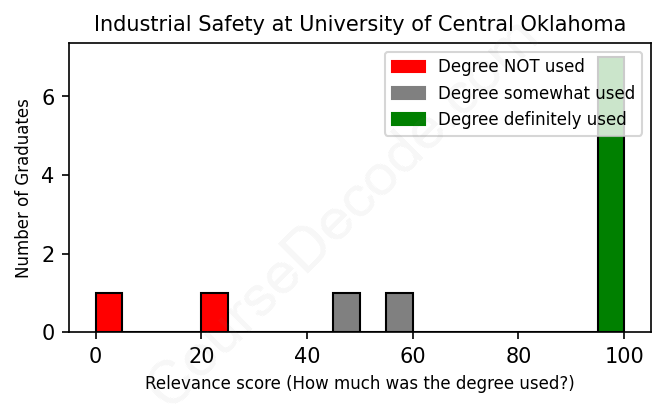
First, some facts. Of the Industrial Safety graduates from University of Central Oklahoma we've analyzed , here's how many have used (or NOT used) their degree in their career:

These are estimates based on AI analysis of 11 LinkedIn profiles (see below).
The verdict? Above average. Overall, with an average relevance score of 74%, Industrial Safety graduates from University of Central Oklahoma have a higher likelihood (+7%) of finding work in this field compared to the average graduate across all fields:
And for comparison, here's the chart for all profiles we've looked at across all degrees.
Also, after graduating, only 9% of these graduates have pursued further education other than another Bachelor's degree (such as a Masters degree or other), compared to the average across all profiles of 35%. This suggests a Bachelors degree is enough for most Industrial Safety graduates, and it's normal to look for work straight after graduation.
See the details:
|
Relevance score: 100% We think this person has gone into a career highly relevant to their degree. We think this person has gone into a career highly relevant to their degree.
DEGREE INFOGraduated in 2013 from University of Central Oklahoma with a Bachelor of Applied Science (B.A.Sc.) in Industrial Safety. No other secondary education since. JOB HISTORY SINCE GRADUATIONSafety facilitator Zachry Industrial, Inc. Jun 2013 - Feb 2015 HSE Specialist II  Forum Energy Technologies Feb 2015 - Present ABOUTNo information provided. |
The top 10 most common jobs done by the graduates we've analyzed (ranked most common to least) are:
Based on the analysis of LinkedIn profiles, it seems like most graduates with a degree in Industrial Safety from the University of Central Oklahoma have landed jobs that are pretty relevant to their field. A lot of them have taken on roles such as HSSE Coordinator, EHS Manager, and Safety Specialist, which directly tie back to the core principles of health, safety, and environmental management that they studied. These roles involve making sure workplace environments are safe and meet necessary regulations, so it makes sense that these positions are filled by people who have that specialized knowledge. For instance, positions like EHS Manager and HSSE Area Manager require a deep understanding of industrial safety practices, and it’s clear that these graduates are applying what they learned in real-world settings.
On the flip side, there are a few examples where the jobs aren't as closely related to industrial safety. For instance, roles like Tableau Developer or Sortation Specialist at Amazon don’t really utilize the safety knowledge those graduates gained during their studies. Those positions focus more on tech or logistics rather than safety management. So, while the majority of the jobs found by these graduates do align well with their degree, there are a few outliers where the connection is only loose, indicating that a degree in Industrial Safety can lead to various career paths, not all necessarily tied to safety management.
Here is a visual representation of the most common words in job titles for Industrial Safety graduates (this is across all Industrial Safety graduates we've analyzed, not just those who went to University of Central Oklahoma):

The career trajectories of graduates from the University of Central Oklahoma with a degree in Industrial Safety generally seem to follow a pretty promising path. Right after graduation, many of them land roles that are closely tied to health, safety, and environmental (HSE) fields. For instance, those graduating around 2011 and 2012 took on positions like HSSE Coordinator and Environmental Safety and Health Intern, which are solid entry points into the industry. This suggests that graduates are typically securing relevant jobs that align well with their academic background, helping them gain valuable experience early on.
As we look a bit further down the line—like five or even ten years after graduating—it appears that many graduates continue to climb the career ladder within HSE roles. Several have transitioned into managerial positions, such as EHS managers and regional QHSSE managers, reflecting both career growth and a sustained connection to their field. Some have even moved up to specialized roles at reputable companies like Boeing. However, there are a few outliers, like those who have shifted entirely away from traditional safety roles into more niche positions (like tableau development), but they still seem to leverage skills that are somewhat related. Overall, it looks like many UCO Industrial Safety alumni find meaningful work in their field, which is pretty encouraging if you're considering following in their footsteps!
A Bachelor’s degree in Industrial Safety, like the one at the University of Central Oklahoma, can be pretty manageable if you're into safety, regulations, and making workplaces safer. It typically combines a mix of technical classes and hands-on learning, which can be a lot of fun if you enjoy projects and real-world applications. That said, it can still be challenging, especially if you’re not a fan of science or math because you’ll run into subjects like chemistry, statistics, and risk assessment. Overall, it’s not necessarily harder or easier than average; it really depends on your strengths and interests. If you’re passionate about safety and willing to put in the effort, you’ll likely find it a rewarding experience!
Most commonly, in the LinkedIn profiles we've looked at, it takes people 2 years to finish a Bachelor degree in Industrial Safety.
Looking at these graduates from the University of Central Oklahoma, it seems like most of them have landed decent jobs in the industrial safety field, which typically pays pretty well. The ones who have climbed the ladder, like the HSSE Coordinator who moved up to a Senior role at Boeing, likely have a good salary, especially with experience under their belts. Others have taken on entrepreneurial roles or advanced positions in established companies, which can also be lucrative. However, some folks, like the recent grads with more entry-level positions or internships, might not be making as much right away, but they’re on the right path to grow their earnings over time. Overall, it looks like they’re doing pretty well for themselves, especially compared to other fields!
Here is a visual representation of the most common words seen in the "about" section of LinkedIn profiles who have a Bachelor degree in Industrial Safety (this is across all Industrial Safety graduates we've analyzed, not just those who went to University of Central Oklahoma). This may or may not be useful:

Here are all colleges offering a Bachelor degree in Industrial Safety (ordered by the average relevance score of their Industrial Safety graduates, best to worst) where we have analyzed at least 10 of their graduates:
| College | Score | Count |
|---|---|---|
 University of Central Oklahoma University of Central Oklahoma
|
74 | 11 |